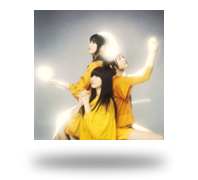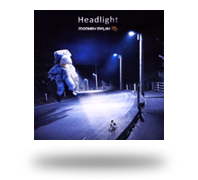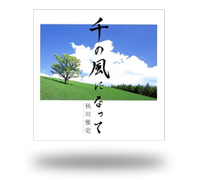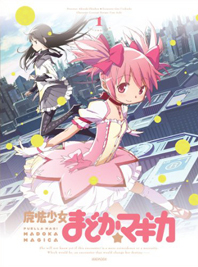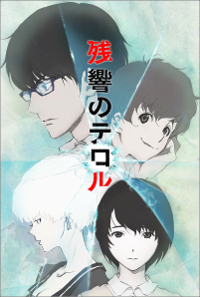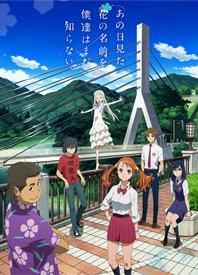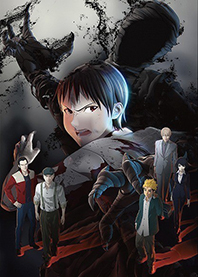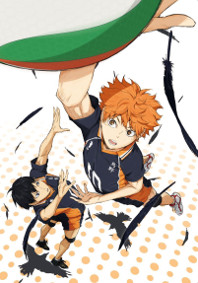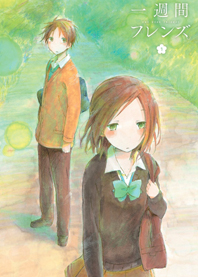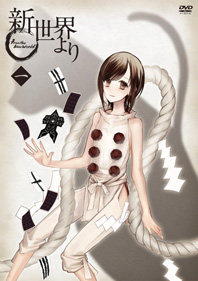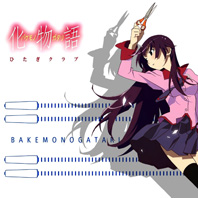コネクト (connect) - ClariS
This page is only for those who have watched "Puella Magi Madoka Magica". The content includes detailed description about the story.
About This Song
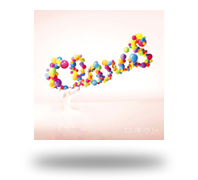
Title: コネクト
Music & Lyrics: 渡辺 翔
Song By: ClariS
Release Date: 2 Feb. 2011
コネクト [konekuto] is the second single by Claris and was used for the opening theme of 魔法少女まどか☆マギカ [mahō shōjo madoka magika] - one of the most popular animation series which won numerous awards.
ClariS is a pop music duo consisting of high school girls Clara and Alice. They do not show up on any media and almost nobody knows who they really are. However, their canary voice alone is more than enough proof of their talent.
Since the sensational debut in 2010, ClariS has been releasing theme songs of big hit animations and has become one of top anime-song artists.

Music Video
See Karaoke Song Album page before you start.
Fan-made music video
Karaoke with lyrics
Click here to view in larger size.
Lyrics


Meaning
This song is about Homura Akemi who is one of main characters of the story. Most viewers realize it at the end of 10th episode and say "Ohhhhh...". The following translation is made from that view point.
Please note that song lyrics (and any art works) can have different interpretations.
I won't forget the promise we made.
| 交わした [kawashita] | exchanged 交わす [kawasu]: to exchange ⇒ 交わした [kawashita]: exchanged (past tense form, used adjectivally) |
|---|---|
| 約束 [yakusoku] | promise |
| Madoka asked Homura to go back to the past and save Madoka before she gets tricked by Kyūbē. In response, Homura promised Madoka to protect her no matter how many times she has to repeat the time travel. |
|
| 忘れない [wasurenai] | I don't forget. 忘れる [wasureru]: to forget + ない [nai]: not (verb-negating suffix) |
| よ [yo] | Particle which indicates strong will 忘れないよ [wasurenaiyo]: I won't forget. |
I close my eyes and make sure of it.
| 目 [me] | eye |
|---|---|
| ...を [o] | Particle which indicates the object of a verb |
| 閉じ [toji] | to close and ... 閉じる [tojiru]: to close ⇒ 閉じ [toji] Verb endings can be omitted when it is followed by another verb. (Usually, ending て [te] is used.) |
| 確かめる [tashikameru] | to make sure, to confirm |
Shaking off the darkness that has closed in on me, I move on.
| 押し寄せた [oshiyoseta] | closed in, surged in 押し寄せる [oshiyoseru]: to close in, to surge in = 押す [osu]: to press + 寄せる [yoseru]: to come near ⇒ 押し寄せた [oshiyoseta] (past tense form, used adjectivally) |
|---|---|
| This phrase is usually associated with a huge mass of heavy weight object. The most typical example is tsunami. | |
| 闇 [yami] | darkness (used as a metaphor for negativity - hopeless destiny) |
| 振り払って [furiharatte] | to shake off and ... 振り払う [furiharau]: to shake off = 振る [furu]: to shake + 払う [harau]: to clear away ⇒ 振り払って [furiharatte] (Verb ending て [te] is used when it is followed by another verb.) |
| 進む [susumu] | to move on, to go forward |
| よ [yo] | Particle which indicates strong will |

How long will it be before I can see my lost future again here?
| いつになったら [itsu ni nattara] |
how long will it be before... いつ [itsu]: when + に [ni]: at + なる [naru]: to be + たら [tara]: particle which indicates supposition |
|---|---|
| This phrase expresses a strong feeling of unsatisfaction. It usually is used when the person complains about the delay. | |
| なくした [nakushita] | lost なくす [nakusu]: to lose something ⇒ なくした [nakushita]: (past tense form, used adjectivally) |
| 未来 [mirai] | the future |
| ...を [o] | Particle which indicates the object of a verb |
| 私 [watashi] | I |
| ここ [koko] | here (the world where Homura presently lives) |
| ...で [de] | at, in (Particle which indicates the place) |
| また [mata] | again |
| 見ること [mirukoto] | seeing, looking 見る [miru]: to see, to look + こと [koto]: nominalizing suffix |
| できる [dekiru] | to be able to do |
| の [no] | Particle which indicates question |

I will tear up the shadow of overflowing anxiety any number of times, and will walk on in this world.
| 溢れ出した [afuredashita] | overflowing, pouring out 溢れ出す [afuredasu]: to pour out = 溢れる [afureru]: to overflow + 出る deru: to go out ⇒ 溢れ出した [afuredashita] (past tense form, used adjectivally) |
|---|---|
| 不安 [fuan] | anxiety |
| の [no] | of |
| 影 [kage] | shadow |
| ...を [o] | Particle which indicates the object of a verb |
| 何度でも [nandodemo] | any number of times 何度 [nando]: how many times + でも [demo]: no matter how |
| 裂いて [saite] | to tear up and ..., to cut up and ... 裂く [saku]: to tear up, to cut up ⇒ 裂いて [saite] (Verb ending て [te] is used to join two sentences) |
| この [kono] | this |
| 世界 [sekai] | the world |
| 歩んでこう [ayundekō] | I will walk on 歩む [ayumu]: to walk + いく [iku]: to proceed, to continue ⇒ いこう [ikō] (volitional form which indicates positive will) |
| Homura is fighting against both "darkness" from outside and "shadow of anxiety" from inside. | |

Endlessly ticking time has now marked a new beginning.
| とめどなく [tomedonaku] | endlessly |
|---|---|
| 刻まれた [kizamareta] | ticked away (time), passed 刻む [kizamu]: to tick (time), to pass ⇒ 刻まれる [kizamareru] (passive voice) ⇒ 刻まれた [kizamareta] (past tense form, used adjectivally) |
| 時 [toki] | time |
| ...は [wa] | Particle which indicates the main topic of a sentence |
| 今 [ima] | now |
| 始まり [hajimari] | beginning |
| 告げ [tsuge] | to inform, to tell 告げる [tsugeru]: to inform, to tell |

Having unchangeable determination in mind, I open the closed door.
| 変わらない [kawaranai] | unchangeable, invariable 変わる [kawaru]: to change + ない [nai] (verb-negating suffix) |
|---|---|
| 思い [omoi] | will, intention, thought |
| ...を [o] | Particle which indicates the object of a verb |
| のせ [nose] | to place on (something), to load (luggage), to take on board のせる [noseru] ⇒ のせ [nose] (Ending of the first verb can be omitted instead of using て [te] to join two sentences.) |
| 閉ざされた [tozasareta] | closed 閉ざす [tozasu]: to close, to shut ⇒ 閉ざされる [tozasareru] (passive voice) ⇒ 閉ざされた [tozasareta] (past tense form, used adjectivally) |
| 扉 [tobira] | door |
| 開けよう [akeyō] | to open 開ける [akeru]: to open ⇒ 開けよう [akeyō] (volitional form which indicates positive will) |

My awoken heart has started to race in order to draw the future.
| 目覚めた [mezameta] | awoken 目覚める [mezameru]: to wake up ⇒ 目覚めた [mezameta] (past tense form, used adjectivally) |
|---|---|
| 心 [kokoro] | heart, mind |
| ...は [wa] | Particle which indicates the main topic of a sentence |
| 走り出した [hasiridashita] | started to run 走り出す [hasiridasu]: to begin to run, to start running = 走る [hashiru]: to run + 出す [dasu]: to begin ⇒ 走り出した [hasiridashita] (past tense form) |
| 未来 [mirai] | the future |
| ...を [o] | Particle which indicates the object of a verb |
| 描く [egaku] | to draw, to paint Here it means "to make the future visible and real". |
| ため [tame] | in order to |

Even if I am stranded on a difficult path, the sky will always be waiting for me with its pure blue color.
| 難しい [muzukashii] | difficult |
|---|---|
| 道 [michi] | path, road |
| ...で [de] | on, at, in (Particle which indicates the place) |
| 立ち止まっても [tachidomattemo] | Even if I am stranded 立ち止まる [tachidomaru]: to halt, to stand still = 立つ [tatsu]: to stand + 止まる [tomaru]: to stop + ても [temo]: even if |
| 空 [sora] | sky |
| ...は [wa] | Particle which indicates the main topic of a sentence |
| きれいな [kireina] | pure, clear, beautiful |
| 青さ [aosa] | blueness This expression of color is related to the phrase "未来を描く draw the future" in the last sentence. |
| ...で [de] | with (Particle which indicates state or condition) |
| いつも [itsumo] | always |
| 待っててくれる [mattetekureru] | to wait (for me) 待つ [matsu]: to wait + ...てくれる [tekureru]: one does a favor for me (expresses a sense of gratitude) |
| The word "空 (sky)" is probably used as a metaphor for the future. Even though it is blocked by obstacles, the bright future will always be there in its pure form. Just like the sky is always clear and blue at higher altitude above clouds. |
|
So, I'm not afraid.
| だから [dakara] | so, therefore |
|---|---|
| 怖くない [kowakunai] | not scary, I'm not afraid. 怖い [kowai]: scary + ない [nai]: not (adjective-negating suffix) |
No matter what happens, I won't lose heart anymore.
| もう [mō] | anymore |
|---|---|
| 何があっても [nani ga attemo] |
no matter what happens 何 [nani]: what + が [ga]: indicates sentence subject + ある [aru]: to be, to happen + ても [temo]: even if |
| 挫けない [kujikenai] | I don't lose heart 挫ける [kujikeru]: to lose heart, to give way + ない [nai]: not (verb-negating suffix) |

Whenever I look back, my friends were there. And before I realize it I was tenderly surrounded by them.
| 振り返れば [furikaereba] | if I look back 振り返る [furikaeru]: to look back, to turn head + ば [ba]: if ... then (Particle which indicates supposition) |
|---|---|
| 仲間 [nakama] | friend, mate, company Probably it means Madoka - the only friend |
| ...が [ga] | Particle which indicates sentence subject |
| いて [ite] | to be, to exist いる [iru] ⇒ いて [ite] (Verb ending て [te] is used to join two sentences) |
| 気がつけば [kigatsukeba] | if I realize, when I realize 気がつく [kigatsuku]: to realize, to become aware of + ば [ba]: if ... then (Particle which indicates supposition) |
| 優しく [yasashiku] | tenderly, gently |
| 包まれてた [tsutsumareteta] | have been surrownded, have been wrapped 包む [tsutsumu]: to wrap, to envelop ⇒ 包まれる [tsutsumareru]: be wrapped (passive voice) ⇒ 包まれてる [tsutsumareteru] (indicates continuous state) ⇒ 包まれてた [tsutsumareteta] (past tense form) |

In a world where everything is distorted, this friendship is the only thing I can trust and from that I could find relief.
| 何もかも [nanimokamo] | anything and everything |
|---|---|
| ...が [ga] | Particle which indicates sentence subject |
| 歪んだ [yuganda] | distorted 歪む [yugamu]: to be distorted, to be crooked ⇒ 歪んだ [yuganda] (past tense form, used adjectivally) |
| 世界 [sekai] | the world |
| ...で [de] | in, at (Particle which indicates the place) |
| 唯一 [yuiitsu] | only, sole |
| 信じれる [shinjireru] | believable, trustworthy 信じる [shinjiru]: to believe, to trust + れる [reru] (indicates the potential) |
| ここ [koko] | here, this place It probably means the friendship remaining in her heart |
| ...が [ga] | Particle which indicates sentence subject |
| 救い [sukui] | relief, rescue, salvation |
| だった [datta] | was |

As we share joy and sorrow, the feelings grow stronger.
| 喜び [yorokobi] | joy, pleasure |
|---|---|
| も [mo] | as well as, also |
| 悲しみ [kanashimi] | sorrow, sadness |
| も [mo] | as well as, also |
| 分け合えば [wakeaeba] | if we share, as we share 分け合う [wakeau]: to share = 分ける [wakeru]: to divide + 合う [au]: to do something to each other + ば [ba]: if ... then (indicates supposition) |
| 強まる [tsuyomaru] | to get strong, to gain strength |
| 想い [omoi] | feelings, emotion |
| There are two kinds of "おもい [omoi]" - "変わらない思い [kawaranai omoi]" and "強まる想い [tsuyomaru omoi]". The pronunciation is the same, but different Kanji symbols are used. In general, "思い" is associated with the mind and "想い" with the heart. Most people do not care about the difference and "思い" is usually used for both cases. |
|

If this voice has reached, I'll surely be able to make a miracle happen.
| この [kono] | this |
|---|---|
| 声 [koe] | voice |
| ...が [ga] | Particle which indicates sentence subject |
| 届くのなら [todokunonara] | if it reaches 届く [todoku]: to reach + のなら [nonara]: if that's the case, if so |
| きっと [kitto] | surely, almost certainly |
| 奇跡 [kiseki] | miracle |
| ...は [wa] | Particle which indicates the main topic of a sentence |
| おこせる [okoseru] | be able to make something happen おこす [okosu]: to make something happen, to cause + ...せる [seru]: be able to... |
| だろう [darō] | I think, I guess (indicates supposition) |
| "this voice" probably means Homura's wish which was made when she became a puella magi. If this wish "to be a person who protects Madoka" is fulfilled, she is supposed to succeed to save Madoka eventually. |
|
I won't forget the promise we made.
I close my eyes and make sure of it.
Shaking off the darkness that has closed in on me, I move on.

No matter how big wall awaits, I'll surely overcome it.
| どんなに [donnani] | how much |
|---|---|
| 大きな [ōkina] | big, large |
| 壁 [kabe] | wall (used as a metaphor for obstacles) |
| ...が [ga] | Particle which indicates sentence subject |
| あっても [attemo] | even if there is ... ある [aru]: to be, to exist, to be located + ても [temo]: even if |
| 越えてみせる [koetemiseru] | I will overcome 越える [koeru]: to go over, to pass over + みせる [miseru] (indicates strong confidence to accomplish something) |
| ...から [kara] | because... |
| きっと [kitto] | surely, almost certainly |
Believe in the future and pray for it.
| 明日 [ashita] | tomorrow (here it means the future) |
|---|---|
| 信じて [shinjite] | believe. 信じる [shinjiru]: to believe, to have faith in ⇒ 信じて [shinjite] (Verb ending て [te] is used when it is followed by another verb) |
| 祈って [inotte] | pray. 祈る [inoru]: to pray, to wish ⇒ 祈って [inotte] (imperative form) |
| Homura is telling this to herself. | |

Having wandered in a broken world, I finally reached as if I was drawn to it.
| 壊れた [kowareta] | broken 壊れる [kowareru]: to break ⇒ 壊れた [kowareta] (past tense form, used adjectivally) |
|---|---|
| 世界 [sekai] | the world |
| ...で [de] | in, at (Particle which indicates the place) |
| 彷徨って [samayotte] | to wander about 彷徨う [samayou]: to wander about ⇒ 彷徨って [samayotte] (Verb ending て [te] is used to join two sentences) |
| 私 [watashi] | I |
| ...は [wa] | Particle which indicates the main topic of a sentence |
| 引き寄せられる [hikiyoserareru] | be drawn by ... 引き寄せる [hikiyoseru]: to draw or pull something towards oneself = 引く [hiku]: to pull, to draw + 寄せる [yoseru]: to let someone approach ⇒ 引き寄せられる [hikiyoserareru] (passive voice) |
| ように [yōni] | as if |
| 辿り着いた [tadoritsuita] | finally arrived at 辿り着く [tadoritsuku]: to finally arrive at = 辿る [tadoru]: to follow (road) + 着く [tsuku]: to arrive at, to reach ⇒ 辿り着いた [tadoritsuita] (past tense) |
Having gone through a number of trial and errors, the promise with Madoka brought Homura to highly determined state of mind. |
|

My awoken heart has started to race in order to draw the future.

Even if I'm stranded on a difficult path, the sky will always be waiting for me with its pure blue color.
So, I'm not afraid.
No matter what happens, I won't lose heart anymore.
Keep on waiting for the hopeful future.
| ずっと [zutto] | continuously in some state (for a long time), always |
|---|---|
| 明日 [ashita] | tomorrow (here it means the future) |
| 待って [matte] | wait. 待つ [matsu]: to wait ⇒ 待って [matte] (imperative form) |
| Homura is telling this to herself. | |
Related Topics
Karaoke Song Album - 千の風になって (A Thousand Winds) by Masafumi Akikawa
Karaoke Song Album - 逢いたくていま (aitakute ima) by MISIA
Karaoke Song Album - Dream Fighter by Perfume
Karaoke Song Album - Headlight by MONKEY MAJIK



